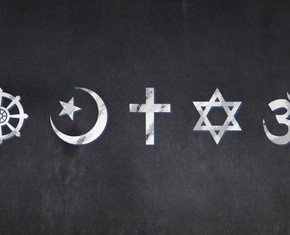The views expressed in our content reflect individual perspectives and do not represent the authoritative views of the Baha'i Faith.
The history of the Jews after the reign of King Solomon essentially tells a story of loss of influence, disintegration of the Jewish Empire and dispersion after conquests by foreign powers – and finally, the appearance of Christ.
When Jesus appeared a thousand years after Moses, the Jewish people lived in a small, poor country in a remote part of the Roman Empire. At that time the Roman Empire had a Hellenistic culture, centered in the cities, with the elite discussing such themes as “one wisdom in the entire world” and “all men are brothers.” However, while a small educated class debated how an individual could make the most of his life, the overwhelming vast majority of the poor wallowed in their ancient superstitions and worshiped many gods.
In the context of that society, Jesus reaffirmed Moses’ teachings to love God and your neighbor – which essentially at the time were other Jews – but then expanded it to include all of humanity:
You have heard that it has been said, Thou shall love thy neighbor and hate thine enemy. But I say unto you, love your enemies, bless them that curse you, do good to them that hate you, and pray for them which despitefully use you, and persecute thee. – Mathew 5:43.
Christ’s powerful revealed message quickly spread through the Roman Empire, and while Christians were initially severely persecuted, Christianity became the official religion of the Roman Empire in the 4th century. But in the 5th century, so-called “barbarians” from the north overran the Roman Empire. However, as the Huns, Goths, Vikings and Francs came into contact with Christianity, they almost without exception eventually gave up their pagan beliefs and became Christians.
Christianity soon became the single unifying force in all of these kingdoms, and led to the development of Europe as we know it today. The Baha’i teachings refer to this remarkable series of historical events as a transformation only a messenger of God could possibly achieve:
Behold! One sanctified Soul revives the world of humanity, transforms the face of the globe, develops the minds, quickens the souls, inaugurates a new life, establishes new foundations, orders the world, gathers the nations and religions under the shadow of one banner, delivers man from the realm of baseness and deficiency, and exhorts and encourages him to develop his innate and acquired perfections. Certainly nothing short of a divine power could accomplish this feat! …
Can this be accomplished through the agency of mere human power? No, by God! … Christ accomplished what all the kings of the earth were powerless to achieve. – Abdu’l-Baha, Some Answered Questions, newly revised edition, pp. 11-12.
From a Baha’i perspective, this civilization-building process happens with the appearance of every major prophet and divine messenger, and has repeated itself many times throughout history:
The endowments which distinguish the human race from all other forms of life are summed up in what is known as the human spirit; the mind is its essential quality. These endowments have enabled humanity to build civilizations and to prosper materially. But such accomplishments alone have never satisfied the human spirit, whose mysterious nature inclines it towards transcendence, a reaching towards an invisible realm, towards the ultimate reality, that unknowable essence of essences called God. The religions brought to mankind by a succession of spiritual luminaries have been the primary link between humanity and that ultimate reality, and have galvanized and refined mankind’s capacity to achieve spiritual success together with social progress.
No serious attempt to set human affairs aright, to achieve world peace, can ignore religion. Man’s perception and practice of it are largely the stuff of history. An eminent historian described religion as a “faculty of human nature”. That the perversion of this faculty has contributed to much of the confusion in society and the conflicts in and between individuals can hardly be denied. But neither can any fair-minded observer discount the preponderating influence exerted by religion on the vital expressions of civilization. Furthermore, its indispensability to social order has repeatedly been demonstrated by its direct effect on laws and morality.
Writing of religion as a social force, Baha’u’llah said: “Religion is the greatest of all means for the establishment of order in the world and for the peaceful contentment of all that dwell therein.” – The Universal House of Justice, The Promise of World Peace, p. 1.
You May Also Like
Comments

















John 14:6 Jesus answered, “I am the way and the truth and the life. No one comes to the father except through me.
Jesus is the door only door to heaven.
John: 14:8 Philip said, “Lord, show us the father and that will be enough for us.”
John: 14: 9 Jesus answered: “Don’t you know me, Philip, even after I have been among you such a long time? Anyone who has ...seen me has seen the father. How can you say, ‘Show us the Father’?
John 5: 22 Moreover, the Father judges no one, but has entrusted all judgment to the Son,
Lord Jesus please forgive them they don't know what they do!